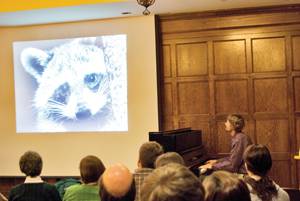Panel says go vegan to save the world

Will Tuttle, Ph.D, performs a piano piece to celebrate world peace and the beauty of the Earth during a panel discussion he hosted in the Oak room of the Memorial Union on Tuesday, Oct. 28, 2008.Tuttle discussed the social, psychological, and spiritual consequences of animal agriculture and the benefits of a vegan diet.
October 27, 2008
Becoming a vegan isn’t difficult, it’s the culture that we live in that makes it a difficult choice.
A panel spoke about the cultural, spiritual and nutritional benefits of a vegan lifestyle Tuesday in the Oak Room of the Memorial Union.
“Every human being, at our core is a vegan,” said Will Tuttle, author of “The World Peace Diet: Eating for Spiritual Health and Social Harmony.”
“Veganism is simply the effort to live a life where I’m not causing cruelty to animals.”
Tuttle said from the time we are born, we are raised in a culture based on the dominance of animals and using them as a food source.
“There are amazing repercussions of this,” he said. “No one has ever really talked about this before. How it affects us spiritually, psychologically, socially, culturally, ecologically and how it affects the environment.”
Tuttle said a meat-eating culture teaches us to disconnect from compassion for nature and life.
He said when people eat animal products, they are not only consuming numerous physical toxins but metaphysical toxins as well.
“We’re eating grief and terror and fear and suffering and anxiety and rage; and what does that do to us?,” Tuttle said. “We’re eating violence, and we express violence. We’re eating fear and we express fear.”
He said we need to build a “tower of beauty” in our bodies, by not eating animal products. Then by not taking these toxins in, we will become happier and more peaceful people.
Erica Fuchs, director of the Center for Plant-Based Diet Development and research associate in food science and human nutrition-Agriculture and Life Sciences, said our culture puts up many barriers to stop people from becoming vegans. These include cultural, informational, economic, governmental and psychological barriers.
“Our children really are encouraged to accept killing animals as good, fun and necessary,” Fuchs said. “They are shielded from knowing about abuses of animals all around us.”
Fuchs said the number one cause of global warming is animal agriculture. She said switching to a plant-based diet is cheaper and reduces more greenhouse gases than buying a Toyota Prius hybrid.
She said while campaigns like Iowa State’s Live Green! initiative are positive, they still have negative impacts because they promote buying food and animal products locally, but do not promote eating a plant-based diet.
Tuttle ended by saying the world’s problems can be solved by going vegan.
“We can all contribute to the healing and blessing of our world,” he said.






